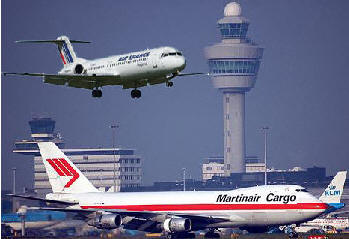|
|||||||||||
|
|
|
|||
|
By |
||||
 |
July 14, 2010 -
Hundreds of air cargo freight forwarders joined in a civil antitrust
class action lawsuit against Air France, KLM and Martinair for their
involvement in price fixing of air cargo shipped to and from the
On Tuesday all
three companies agreed to pay an out of court settlement of $87 million
to those freight forwarders affected by the price fixing scheme.
This settlement
must be approved by the court before any money can be returned back to
these freight forwarders. In a letter the companies stated that indirect
buyers that used an intermediary to ship their goods would be barred
from such claims. |
|||
|
|
||||
|
?This is an important settlement,? Michael
Hausfeld, a lawyer for the freight shippers, said in a statement on
Tuesday. ?We now look forward to seeking appropriate redress for the
indirect shippers, who also suffered substantial unlawful
overcharges as a result of the cartel.?
Antitrust regulators worldwide have been
investigating over a dozen air carriers of price fixing since 2006 and
as a result have fined several companies. In 2008, Air France, Cathay
Pacific Airways, KLM, Martinair and SAS Cargo Group had agreed to each
plead guilty and pay criminal fines totaling $504 million for
participating in a multi?year conspiracy to fix prices for air cargo
rates in the Of the $504 million in fines, Air France-KLM, which
now operates under common ownership by a single holding company, has
agreed to pay a $350 million criminal fine, the second highest fine ever
levied in a criminal antitrust prosecution. According to the charges filed in the U.S. District
Court for the |
||||
|
Air
Cathay is a
corporation organized and existing under the laws of the Hong Kong
Special Administrative Region of the People?s Republic of
Martinair is a
corporation organized and existing under the laws of the
SAS, a subsidiary
of
The above
companies participated in meetings, conversations and communications in
the
?The air cargo
conspirators artificially raised the prices paid to ship billions of
dollars of goods,? said Scott D. Hammond, Deputy Assistant Attorney
General in charge of Criminal Enforcement for the Department?s Antitrust
Division. ?When these companies and their coconspirators got together
and agreed to raise prices for air cargo shipments, American businesses
and consumers ended up picking up the tab.?
On Aug. 23, 2007,
British Airways Plc pleaded guilty and was sentenced to pay a $300
million criminal fine for conspiring to fix cargo rates for
international air shipments, including to and from the United States,
and to fix passenger fuel surcharges for long-haul international air
transportation, including between the United States and United Kingdom.
The same day, Korean Air Lines pleaded guilty and was sentenced to pay a
$300 million criminal fine for conspiring to fix cargo rates charged to
customers in the
On Jan.14, 2008,
Qantas Airways Limited pleaded guilty and was sentenced to pay a $61
million criminal fine for its role in a conspiracy to fix cargo rates to
customers in the
On June 26, 2009
in
The carriers
admitted to fixing surcharges on air cargo exported on certain routes
from
"The cooperation
of these parties through the Bureau?s leniency program will assist in
our ongoing conspiracy investigation," said Melanie L. Aitken, Interim
Commissioner of Competition. "Had these companies not cooperated, the
Bureau would have recommended harsher penalties against these companies,
including significantly higher fines."
Air France, KLM,
and Martinair were convicted in
This investigation
was commenced following a confidential immunity application. Under the
Bureau?s Immunity Program, the first party to disclose to the Bureau an
offence not yet detected, or to provide evidence leading to the filing
of charges, may receive immunity from the Director of Public
Prosecutions, provided the party fully cooperates with the Bureau.
The carrier that
approached the Bureau early in its investigation of criminal activities
was also able to benefit from leniency, such as reduced penalties, in
return for their cooperation. Obtaining the cooperation of implicated
parties through the Bureau?s Immunity and Leniency Programs is one of
the Bureau?s best weapons to combat these secret criminal
anti-competitive agreements.
In February 2009 a
Federal Court in Sydney Australia orders Air France, KLM Airlines,
Martinair and Cargolux International Airlines to pay a total of $16
million in penalties for price fixing. Air France and KLM admitted to
making and giving effect to illegal price fixing understandings with
Lufthansa, repeatedly exchanging assurances with Lufthansa in the
implementation of fuel surcharge increases for international carriage of
air cargo across their global networks.
Martinair admitted
that by no later than early 2003, it had arrived and gave effect to
illegal price fixing understandings with KLM and Cargolux that they
would have discussions and exchange and confirm information with each
other in relation to the application of fuel surcharges on cargo carried
internationally by air across their respective global networks.
Cargolux admitted
to making and giving effect to illegal price fixing understandings with
each of Lufthansa, Air France and KLM that each of them would impose a
fuel surcharge on cargo carried internationally by air across their
networks, (except where local conditions in a particular port or in a
particular geographic area prevented the imposition, or full imposition,
of the fuel surcharge). |
|
|
| Other News Stories |
| ?AvStop
Online Magazine
Contact
Us
Return To News
|
|


